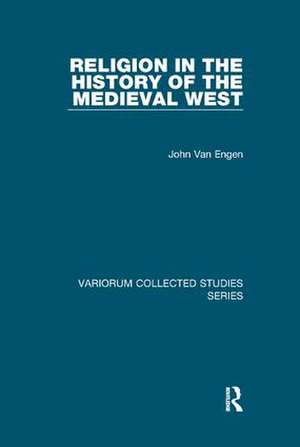Religion in the History of the Medieval West: Variorum Collected Studies
Autor John Van Engenen Limba Engleză Paperback – 10 iun 2019
Din seria Variorum Collected Studies
-
 Preț: 313.38 lei
Preț: 313.38 lei -
 Preț: 311.41 lei
Preț: 311.41 lei -
 Preț: 299.55 lei
Preț: 299.55 lei -
 Preț: 325.68 lei
Preț: 325.68 lei -
 Preț: 406.12 lei
Preț: 406.12 lei -
 Preț: 311.18 lei
Preț: 311.18 lei -
 Preț: 325.31 lei
Preț: 325.31 lei -
 Preț: 396.01 lei
Preț: 396.01 lei - 9%
 Preț: 1039.89 lei
Preț: 1039.89 lei -
 Preț: 266.20 lei
Preț: 266.20 lei -
 Preț: 343.34 lei
Preț: 343.34 lei - 9%
 Preț: 938.10 lei
Preț: 938.10 lei -
 Preț: 351.48 lei
Preț: 351.48 lei - 9%
 Preț: 938.86 lei
Preț: 938.86 lei -
 Preț: 335.37 lei
Preț: 335.37 lei - 9%
 Preț: 937.14 lei
Preț: 937.14 lei -
 Preț: 351.42 lei
Preț: 351.42 lei -
 Preț: 320.00 lei
Preț: 320.00 lei - 38%
 Preț: 766.84 lei
Preț: 766.84 lei - 23%
 Preț: 315.48 lei
Preț: 315.48 lei - 36%
 Preț: 740.06 lei
Preț: 740.06 lei - 34%
 Preț: 764.20 lei
Preț: 764.20 lei - 39%
 Preț: 684.75 lei
Preț: 684.75 lei - 29%
 Preț: 247.40 lei
Preț: 247.40 lei - 37%
 Preț: 488.89 lei
Preț: 488.89 lei - 38%
 Preț: 766.91 lei
Preț: 766.91 lei - 34%
 Preț: 769.51 lei
Preț: 769.51 lei - 38%
 Preț: 769.85 lei
Preț: 769.85 lei - 36%
 Preț: 823.43 lei
Preț: 823.43 lei - 25%
 Preț: 225.28 lei
Preț: 225.28 lei - 25%
 Preț: 225.54 lei
Preț: 225.54 lei - 34%
 Preț: 767.07 lei
Preț: 767.07 lei - 34%
 Preț: 764.20 lei
Preț: 764.20 lei - 34%
 Preț: 736.38 lei
Preț: 736.38 lei - 34%
 Preț: 738.43 lei
Preț: 738.43 lei - 25%
 Preț: 226.52 lei
Preț: 226.52 lei - 33%
 Preț: 491.66 lei
Preț: 491.66 lei - 34%
 Preț: 485.78 lei
Preț: 485.78 lei - 34%
 Preț: 485.78 lei
Preț: 485.78 lei - 38%
 Preț: 766.34 lei
Preț: 766.34 lei - 36%
 Preț: 739.17 lei
Preț: 739.17 lei - 31%
 Preț: 473.94 lei
Preț: 473.94 lei - 18%
 Preț: 843.63 lei
Preț: 843.63 lei - 38%
 Preț: 774.91 lei
Preț: 774.91 lei - 38%
 Preț: 769.92 lei
Preț: 769.92 lei - 34%
 Preț: 764.20 lei
Preț: 764.20 lei - 50%
 Preț: 488.81 lei
Preț: 488.81 lei - 36%
 Preț: 488.49 lei
Preț: 488.49 lei - 34%
 Preț: 769.10 lei
Preț: 769.10 lei - 38%
 Preț: 766.99 lei
Preț: 766.99 lei
Preț: 303.43 lei
Preț vechi: 343.54 lei
-12% Nou
Puncte Express: 455
Preț estimativ în valută:
58.06€ • 62.09$ • 48.41£
58.06€ • 62.09$ • 48.41£
Carte tipărită la comandă
Livrare economică 18 aprilie-02 mai
Preluare comenzi: 021 569.72.76
Specificații
ISBN-13: 9781138382466
ISBN-10: 1138382469
Pagini: 344
Dimensiuni: 150 x 224 mm
Greutate: 0.64 kg
Ediția:1
Editura: Taylor & Francis
Colecția Routledge
Seria Variorum Collected Studies
Locul publicării:Oxford, United Kingdom
ISBN-10: 1138382469
Pagini: 344
Dimensiuni: 150 x 224 mm
Greutate: 0.64 kg
Ediția:1
Editura: Taylor & Francis
Colecția Routledge
Seria Variorum Collected Studies
Locul publicării:Oxford, United Kingdom
Cuprins
Contents: Preface; Approaches to Medieval Culture and Religion: The Christian Middle Ages as an historiographical problem; The future of medieval Church history; The 'crisis of cenobitism' reconsidered: Benedictine monasticism in the years 1050-1150; An afterword on medieval studies, or the future of Abelard and Heloise. Christening the Social Order: Christening the Romans; Faith as a concept of order in medieval Christendom; Theophilus Presbyter and Rupert of Deutz: the manual arts and Benedictine theology in the early 12th century; 'God is no respecter of persons': sacred texts and social realities. Re-inventing Religious Life in Medieval Society: Dominic and the brothers: Vitae as life-forming exempla in the Order of Preachers; Friar Johannes Nyder on laypeople living as religious in the world; Index.
Notă biografică
John Van Engen is the Andrew V. Tackes Professor of History at the University of Notre Dame, USA.
Recenzii
'The pieces reprinted here [...] are filled with good judgement, display a breadth of learning, and will manage to fascinate their readers through the many intriguing human details and anecdotes they contain.' The Medieval Review 'One of the benefits of reviewing a volume in the Variorum Collected Studies Series is that it can provide the opportunity to reread stimulating and formative work which had such an impact when originally produced that the ideas have since become almost taken for granted among academics... a significant collection of stimulating scholarship, which it is certainly worthwhile and rewarding to have brought together and republished in this way.' Heythrop Journal
Descriere
These ten essays by John Van Engen situate religion in the history of medieval Western Europe: as an unavoidable presence in everyday life, as a conceptual framework for social and political life, as a force integral to its historical dynamics. Four of the essays are bibliographical and retrospective in nature, reviewing the field broadly, but also pointing toward a more dialectical approach to understanding the interaction of religion and society in the European middle ages. Other studies deal with large topics usually subsumed under the abstract term 'Christianization'. They grapple with learned sources as well as those associated with 'popular' religion, and show what can be gained from an imaginative use of all that lawyers and theologians said about religion in their society. The essays, finally, look for the quality and dynamic of change, even inventiveness, released by religious action and conviction in medieval European society.
